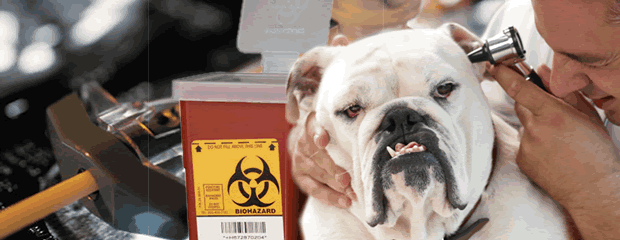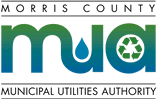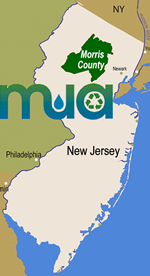Transfer Station Info (Tip Fee $113.00/ton)
- Mt. Olive Mon-Fri 7:30am-3pm; Sat 7:30am-11am
- Parsippany Mon-Fri 7am-3pm; Sat 7:30am-11am
- Closed Sundays and Major Holidays
- No Rental Trucks
- Payment by Account, Check, Credit Card. No Cash

Medical Waste Management
Morris County health care organizations, which include nursing homes, hospitals, clinics, doctors’ offices, dental offices, veterinary facilities, and other medical laboratories and research facilities, must learn to manage all their waste according to New Jersey and Morris County rules. This page presents the types of waste that a health care organization many generate and a description of how these wastes must be managed.
There are three types of wastes which health care organizations generate. These include:
- Regulated Medical Waste(RMW);
- Non-Regulated Medical and/or Commercial Solid Waste (Type 10);
-
Recyclable Waste.
Click here for home medicine and sharps disposal information,
1 - Regulated Medical Waste (RMW)
RMW is defined as any solid waste generated in the diagnosis, treatment, immunization, or research of human beings or animals or in the production or testing of biologicals. The waste generator must make arrangements with a licensed hauler and have the RMW manifested and transported to a designated RMW collection facility. This material cannot be disposed of at the MCMUA Transfer Stations.
Click here for a link to NJDEP's guidance document regarding regulated medical waste or click here to view the NJDEP's listing of authorized regulated medical waste transporters.
New Jersey Department of Environmental Protection specifies the following list of medical wastes to be tracked under N.J.A.C. 7:26-3A.6(a):
- Isolation wastes: Biological waste and discarded materials contaminated with blood, excretion, exudates, or secretions from humans who are isolated to protect others from certain highly communicable diseases, or isolated animals known to be infected with highly communicable diseases.
- Cultures and stocks of infectious agents and associated biologicals: Cultures and stocks of infectious agents and associated biologicals; including cultures from medical and pathological laboratories; cultures and stocks of infectious agents from research and industrial laboratories; wastes from the production of biologicals; discarded live and attenuated vaccines; and culture dishes and devices used to transfer, inoculate and mix cultures.
- Human blood and blood products: Liquid waste human blood; products of blood; items saturated and/or dripping with blood; or items that were saturated and/or dripping with human blood that are now caked with dried human blood; including serum, plasma, and other blood components, and their containers, which were used or intended for use in either patient care, testing and laboratory analysis or the development of pharmaceuticals. Intravenous bags are also included in this category.
- Pathological wastes: Human pathological wastes, including tissues, organs and body parts and body fluids that are removed during surgery or autopsy, or other medical procedures, and specimens of body fluids and their containers.*
- Sharps: Sharps that have been used in animal or human patient care or treatment or in medical research, or industrial laboratories, including hypodermic needles, syringes (with or without the attached needle), Pasteur pipettes, scalpel blades, blood vials, needles with attached tubing, and culture dishes (regardless of presence of infectious agents). Also included are other types of broken or unbroken glassware that were in contact with infectious agents, such as used slides and cover slips.
- Animal waste: Contaminated animal carcasses, body parts, and bedding of animals that were known to have been exposed to infectious agents during research (including research in veterinary hospitals), production of biologicals, or testing of pharmaceuticals.
-
Unused sharps: The following unused, discarded sharps: hypodermic needles, suture
needles, syringes, and scalpel blades.
* Regulated body fluids means liquids emanating or derived from humans and limited to blood; cerebrospinal, pericardial, peritoneal, pleural and synovial fluids; and semen and vaginal secretions. Dialysate solution and amniotic fluid have also been recently included in this definition by the EPA.
2 - Non-Regulated Medical and/or Commercial Solid Waste
Prior to February 2013, non-regulated medical appearing waste was accepted at the MCMUA transfer stations as its own unique waste stream which required special handling and additional fees associated with it. Staring in February 2013, the MCMUA transfer stations eliminated the acceptance of non-regulated medical waste as its own unique waste stream began to accept accept this type of non-regulated medical waste as part of the Type 10 municipal solid waste stream. As such, non-regulated medical waste can now be combined with traditional Type 10 municipal solid waste for disposal at the MCMUA transfer stations. For the most part, prior to February 2013, non-regulated medical waste was delivered separately from Type 10 municipal solid waste for disposal at the MCMUA transfer stations.
The non-regulated medical waste refers anything which a patient may have touched (e.g. tongue depressors, examining table paper, cups, bibs, tubing, adult diapers, etc.) but is not RMW. Since this waste is not RMW it can be collected by a normal solid waste collection company for transport to one of the Morris County Transfer Stations. This waste can be disposed of at the transfer stations at rates typically much less expensive than RMW and without much of the paperwork associated with manifesting RMW as required by law.
Health care facilities will also generate normal Type 10 municipal solid waste. This waste includes all waste that is not RMW, non-non-regulated medical waste as described above and, is not recyclable. This Type 10 municipal solid waste is typically generated by the administrative or office portions of a health care organization. Type 10 municipal solid waste can be combined with the non-regulated medical waste to be disposed of through the MCMUA's transfer stations. Note, the MCMUA transfer stations cannot accept any regulated medical waste and /or mandated recyclables, so health care facilities need to make arrangements to have both regulated medical waste and their recyclables managed by facilities appropriate to accept such materials.
3 - Recyclable Waste
In accordance with the NJDEP certified as approved Morris County Solid Waste Management Plan, source separated recycling is the primary method of recycling materials and is required for all designated recyclable materials. Source separation means the materials are separated at the source from the trash by the generator so they can be recycled. Morris County's list of mandated materials include: (a) aluminum containers, (b) household batteries, (c) corrugated cardboard, (d) glass containers, (e) mixed paper, (f) newspaper, (g) plastic containers (#1 and #2), (h) steel cans, (i) asphalt roofing shingles, (j) automobile batteries, (k) motor oil, (l) oil-contaminated soil, (m) stumps, (n) tires, (o) vegetative waste (leaves, brush, grass), and (p) white goods (appliances). Note, you may provide the recycling of the required recyclables through the private market. Finally, you should contact your municipality to discuss what options they may provide you.


